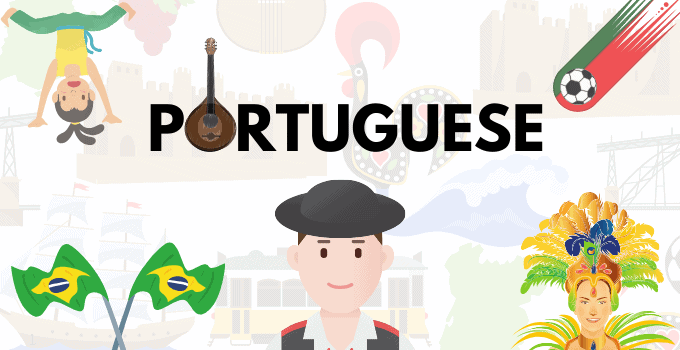Maybe you’re interested in romance languages, maybe you like carnival and samba, maybe you just didn’t want to follow the mainstream and learn the other, more popular Iberian language that shall not be named.
Maybe you’ve visited Portugal and fell in love with the Fado or maybe you’ve spent some time in Angola and got to watch a roda de Capoeira first hand, and now you absolutely can’t live without knowing what those songs meant.
Well fear not! Linguaholic is here to help you. Like the Portuguese sailors, let us jump right into this untamed sea together, looking to brave the currents of knowledge and discover a whole new world of romance language speakers!
Fortunately, we have prepared this short little map to guide you on your journey.

O “Bêabá”: Learning your “ABCs”
Fortunately for most people already acquainted with English or other popular languages, Portuguese uses the same old Latin Alphabet with 26 letters, five diacritics to denote stress, vowel height, contraction, nasalization and assibilation.
The “Bêabá” is a word that comes from the reunion of the letters that make part of the alphabet.
In Portuguese, it means the exercise of spelling, the rudiments of making sounds with letters.
In Portuguese, the combination of letters is important because there are many phonetic features that are not usual in other languages. Some letter combinations (also known as digraphs) such as “nh” and “lh” are notoriously difficult to pronounce.
This article from PortuguesePod101 is a great place to start overcoming these first hurdles in your way to learning.
Emphasis on the syllables
Knowing how to separate words into syllables, and identifying is essential for Portuguese, for the placement of certain diacritics such as the acute accent, the circumflex accent, and the grave accent are all based on the position of the emphasis on the word’s syllables.
Primary stress may fall on any of the three final syllables of a word.
A word is called Oxytone if it is stressed on its last syllable, Paroxytone if the stress falls on the syllable before the last, and a Proparoxytone if stress falls on the third syllable from the end.
Knowing these basics will really help you along the way!
Once you’re acquainted with the main inflectional paradigms and the basics of spelling and the alphabet, you can feel safe moving on to tackle bigger concepts.
Brazilian Portuguese vs. European Portuguese
Before we move on, it is important to note that as far as pronunciation and vocabulary your mileage may vary depending on if you choose to focus on European Portuguese or Brazilian Portuguese.
First of all, when it comes to the accents themselves, Brazilian Portuguese places greater emphasis on open vowels, whereas European Portuguese tends to drop a lot of vowel sounds, and similarly to some languages like Russian and Polish, sound more like a cadence of consonants and doughy sounds.
Thankfully, due to the Portuguese Language Orthography Agreement of 1990, there are no more separate Portuguese spelling standards and all follow one single rule.
But for curiosity sake, there used to be marked differences such as: Presence or absence of certain consonants: such as in the words “ação” (Brazilian Portuguese) vs “acção” (European Portuguese)
Different use of diacritics: “anônimo” (Brazilian Portuguese) vs “anónimo” (European Portuguese) Different usage of double letters: “comumente” (Brazilian Portuguese) vs “comummente” (European Portuguese)
Differences in vocabulary
Due to how recent the Orthography Agreement is, you might still encounter these differences between older texts that haven’t been updated yet.
There are also marked differences in vocabulary. For example, in Brazilian Portuguese, you might call a train “Trem”, but in European Portuguese, it would be a “Comboio”.
A cup would be “xícara” for the american portuguese speakers, whereas in europe it would be a “chávena”.
What is brown in Brazil would be “marrom”, but it would be “castanho” in Portugal and elsewhere. So which kind should you choose?
Why not both! But if that is too daunting, maybe focus on the kind that appeals to you the most.
And don’t be afraid of choosing wrong, because it is the same language after all and you will be able to communicate to whomever with very little effort.
Setting sail towards fluency
Duolingo and Rosetta Stone might be the most common apps, and they’re a great way to get off the ground, but don’t rely solely on those!
If you’re into learning the old-fashioned way, with a grammar book, you could do far worse than with John Whitlam’s Modern Brazilian Portuguese Grammar: A Practical Guide.
Passaporte para Português is a simpler, less dense book for those looking for lighter reading, or those not particularly interested in focusing on Brazilian Portuguese.
It should take you to about beginner level to B1 in around 180 hours of study.
The book Muito Prazer offers to teach you how to greet and speak Brazilian Portuguese with precision.
To get some vocabulary going, you might want to try 501 Portuguese verbs that conjugates all the verbs in all tenses with handy English translations so you know what you’re speaking.
For a resource tooled specifically for those interested in European Portuguese, the site Practice Portuguese promises to teach you Portuguese from Portugal just as it’s spoken in Lisbon, Porto and Algarve, strictly (that is, without all that silly Brazilian nonsense!).
As mentioned previously, PortuguesePod101 offers plenty of free material including a few podcasts. Brazilian Portuguese Podcast by Semantica is also a great mini-series with brief lessons that can really go a long way in teaching you the very basics.
Todo Mundo Pod is a website made by Brazilian journalist Marcos Sales that includes a blog and an archive of podcasts so you can also train your ear.
As most other foreign-language speakers, Portuguese speakers also make use of a plethora of idioms and slang in current speech.
If you’re already an intermediate to advanced level Portuguese speaker, or if you’re interested in the more casual side of speaking Portuguese, you might be interested in the websites “Speak like a Brazilian” and “Dicionário Informal ”
If” you’re looking for something akin to a phrasebook, if you have an Android phone, “Learn Brazilian Phrasebook” is a nifty little app available on the Google Play store.
It comes with all sorts of different phrases sorted by topic, with quick voice snippets so that you can learn how to pronounce them as well (the developer, Codegent, also has many different phrasebook apps for different languages also!).
The best possible advice: Immerse yourself
As with any language, the most important thing is immersion.
The process of learning languages relies mostly on acquisition. Stephen Krashen, a renowned linguist and professor of the University of Southern California, wrote extensively about the process of learning languages through what he described as “comprehensible input”.
Learning and improvement come from a steady supply of communicative and comprehensible input.
Therefore, the best way you can help yourself learn is to surround yourself with the language. Find people to talk to in Portuguese.
Find books you want to read. Find music, movies, television series that you want to watch and, without any subtitles, focus on making out the sounds and passively take in the language without any pressure.
Even as simple a trick as changing your language settings on your computer or phone, to help yourself be in constant contact with the language, and frequently remembering words that you naturally will find useful for navigating your way, is a great way to learn.
Finding Portuguese-speakers who are willing to help you along the road of understanding the language is incredibly useful.
So, why not join our Linguaholic Discord Server? We got over 1300 members there and many native Portuguese speakers. To join & learn with us, simply follow this link here: https://discord.gg/zkfKfk2. And don’t worry. It’s absolutely free.
Not many people have the luxury of travelling to a Portuguese-speaking country or enrolling in a Portuguese language course, but through the internet that has become not only way more affordable, but in some cases entirely free.
Sites like StreetSmart Brazil and iTalki can offer you the means through which you can find online Portuguese professors.
Patience. There are no shortcuts.
Regardless of the level of competence you want to achieve within any language, there are no shortcuts. The amount you get from your studies will always be directly proportional to the amount of time you dedicate towards learning.
But not every practice method will get you there. “Binging” all of your learning all at once without spaced repetition is not a good way to go about it.
It is important to remember, however that there is no such thing as “perfect practice”: regardless of which methods you choose, always aim for consistency, not perfection.
Spaced repetition is a method through which you can trick your brain into thinking “okay, this is important, I should remember this”.
The longer you go without reinforcing the things you have learned, the more likely you are to forget it. This is why it’s so important to practice every day even if it’s only a couple of hours, or even minutes, per day.
Fluency in Portuguese, according to the Foreign Service Institute (FSI) is a Category I language.
That means, if you are an English speaker (and if you’re reading this we assume you are), it would take about 23-24 weeks or 575-600 class hours to achieve “General Professional Proficiency” in both speaking and reading the language.
Remember, this is based on proficiency, fluency is in another ballpark altogether. That being said, on the grand scheme of things, Portuguese is a relatively easy language to learn if you are already fluent in English (or if it’s your mother language).
For a bit of perspective, if your goal were to learn Czech or Greek, it would take on average 1,100 class hours to learn it (almost double the effort!) .
And furthermore, everyone learns at different paces. So do not feel discouraged if you’ve already sunk a lot of time into it already and aren’t proficient yet; as long as you’re consistent, fluency will come naturally.
In conclusion
Learning any language can be a daunting process. No two persons attempting to learn Portuguese will go about it exactly in the same way.
Some people handle a grammatical approach to learning better than some others. Some people’s minds remember things more easily through sight, some others through hearing.
So long as you take your time and build good foundations for yourself before tackling more complicated tasks, learning Portuguese can be both easy and fun. It’s important to stay motivated and remember your goals. And stay tuned!
We will be adding more and more articles pertaining to Portuguese soon, so you can learn more about the language right here!
In closing words, maybe this snippet of a poem by Portuguese author Fernando Pessoa will serve as inspiration along your journey (keeping in theme with the sailing motif):
“Valeu a pena? Tudo vale a pena
Se a alma não é pequena.
Quem quer passar além do Bojador
Tem que passar além da dor.
Deus ao mar o perigo e o abismo deu,
Mas nele é que espelhou o céu.”

Hey fellow Linguaholics! It’s me, Marcel. I am the proud owner of linguaholic.com. Languages have always been my passion and I have studied Linguistics, Computational Linguistics and Sinology at the University of Zurich. It is my utmost pleasure to share with all of you guys what I know about languages and linguistics in general.

